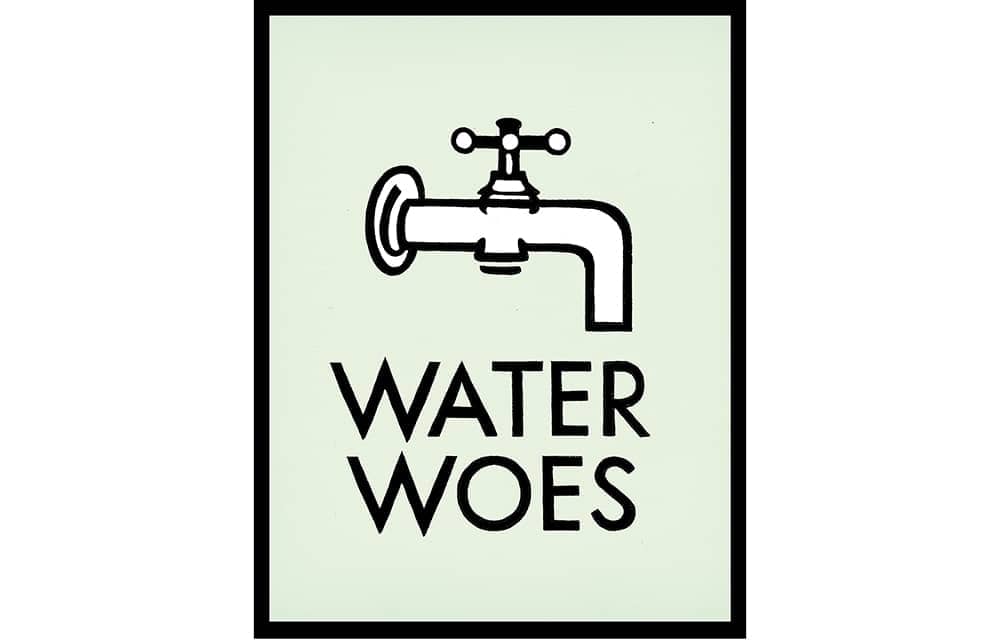No competition
Sir: Ross Clark’s compelling critique of the water companies comes to the wrong conclusion (‘Water isn’t working’, 13 August). He is right to say that water privatisation has been a failure, but this was inevitable given the nature of the industry – a monopoly providing an essential public service. Clark’s suggestion that there should be more competition is unworkable for the simple reason that there is too much fixed investment stretching back to the 19th century and we all have only one pipe into our homes. There are parallels with the rail industry, where a quarter of a century of trying to introduce competition has resulted in a handful of open access services and vastly higher costs. The need for regulation, price controls and social provision result in what I have called ‘faux capitalism’. Capitalists should stick to industries where genuine entrepreneurs can make more money by selling more, not by trying to outdo – often all too easily – the regulators.
Christian Wolmar
London N7
Regulatory failures
Sir: I worked at Thames Water in 1995 and recall the company campaigning enthusiastically to build a new reservoir near Abingdon. The rationale given was that the consequent increase in the company’s capital spending would persuade the regulator to allow Thames to raise bills by more than the standard inflation-based amount. So I doubt Ross Clark’s statement that our water companies show a ‘reluctance to invest in new infrastructure other than that required to meet regulator demands’. However, if the costs to the water companies of breaking the regulator’s rules and failing its targets are less than what it would cost to properly maintain the infrastructure, it is no surprise that they do.
Clark fingers the Environment Agency for some misguided decisions over the years. In the past few decades, Britain appears to have lost the ability to construct badly needed strategic infrastructure – reservoirs, roads, oil refineries, power stations. Perhaps in a future piece, Clark could review the agency’s baleful role in bringing about our current malaise.
Richard North
Hayling Island, Hampshire
Lower the flow
Sir: Martin Vander Weyer (Any other business, 13 August) informed us that a friend had ‘radically reset’ his boiler to improve its efficiency. Greg Jackson, founder of Octopus Energy, has easier advice for those with condensing combi boilers: turn the flow rate down to 60 degrees. The Heating and Hot Water Council says this could save 6 to 8 per cent on gas bills. Do it now, ready for winter.
Eddie Hughes
MP for Walsall North
Yours truly
Sir: I have often inflicted my unsolicited opinions on Christopher Howse, the Telegraph letters page editor (‘Send off’, 13 August). As he is leaving his role, I would like to thank him both for the immense patience with which he’s endured my relentless verbiage and for the occasions when he’s favoured me by printing a missive. The feeling of contributing to the conversation when you see your name on the page is a truly precious moment.
Robert Frazer
Salford, Lancashire
My work is done
Sir: As a fairly regular correspondent to a number of periodicals, I greatly enjoyed Christopher Howse’s piece on the joys of editing a newspaper letters page. Over the years, letters of mine have achieved most of the coveted positions. If this – a letter about writing letters – makes it, I shall regard my work as done, sit back in my armchair, and triumphantly unwrap a Werther’s Original.
Christopher Goulding
Newcastle upon Tyne
The brothers Monsarrat
Sir: I was interested to read the review of Uncommon Courage: The Yachtsmen Volunteers of World War II (Books, 13 August). My father, Denys Monsarrat, was Nicholas’s younger brother, and although he started out by crewing for Nicholas, he became perhaps the better sailor, winning the Trearddur Bay Sailing Club Novice Cup and Regatta Cup in 1930 when he was only 16.
Unlike Nicholas, he joined the army rather than the navy at the outbreak of war, and was sadly killed in North Africa in 1943, when I was too young to remember him. Later Nicholas wrote a book called My Brother Denys in which he describes their sailing exploits. His description of the agonising tension which builds up at the beginning of a race, as the boats jockey for position on the starting line, would be recognised by anyone who has ever done any competitive sailing. The final sentence in the book about Denys reads: ‘I wish I had known him better.’ Me too.
Gillian Ford
Dorchester, Dorset
Memories of Mickey
Sir: Your letter from Vida Saunders about her father’s devotion to The Spectator (Letters, 13 August) reminded me of our life in Abadan, Persia, in about 1939, and as children playing with Mickey Bayandor, surely Vida’s father. At last we have found out what happened to him after the war scattered us across the world.
Shirley Campbell
Leominster
All kinds of readers
Sir: Tony Devenish’s letter in last week’s magazine mentions a ‘typical Spectator reader’. I don’t know what that is; I’ve been a subscriber for many years, as I have to Private Eye and the Guardian. I have never voted Conservative and cannot ever imagine doing so. I enjoy the Speccie for the quality of its writers, for its arts reviews, and for the stimulation of reading opinions directly opposing my own.
Paul Dodd
Bromsash, Herefordshire






Comments